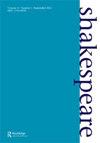革命的血腥之手:俄国布尔什维克的麦克白
IF 0.2
3区 文学
0 LITERATURE, BRITISH ISLES
引用次数: 0
摘要
摘要西方研究1917年十月革命后俄国对莎士比亚政治悲剧的反应,传统上只关注哈姆雷特,很少关注麦克白的命运。这篇文章认为,早期的苏俄将《麦克白》视为一部向观众传递革命信息的戏剧,并为政治暴力重塑的世界提供了一个在意识形态上有用的视角。它通过分析那些受到十月革命暴力事件困扰的人创作的文本中对麦克白的影射,以及布尔什维克政权支持者对这些影射的回应,探讨了苏俄早期对麦克白阅读的控制权争夺。本文考察了革命后第一年对《麦克白》的两个阶段的解读,认为具有意识形态头脑的导演和评论家最终输掉了这场竞争,被迫放弃了在剧中定位十月革命的计划,认为这是无利可图的。我认为,从20世纪20年代中期到整个意识形态强烈的斯大林主义时代,苏联中央阶段没有发生这场悲剧,这并不是中立的不感兴趣,而是对其潜在的颠覆性政治信息的积极担忧。本文章由计算机程序翻译,如有差异,请以英文原文为准。
The Revolution’s Bloody Hands: Macbeth in Bolshevik Russia
ABSTRACT Western studies of the Russian response to Shakespeare’s political tragedy after the October Revolution of 1917 have traditionally focused on Hamlet and paid little attention to the fortunes of Macbeth. This article argues that early Soviet Russia saw Macbeth as a play that sent a revolutionary message to its audiences and offered an ideologically useful vision of the world re-made by political violence. It explores the competition for control over the readings of Macbeth in early Soviet Russia by analysing the allusions to Macbeth in texts produced by those troubled by the violence of the October Revolution and the responses to these allusions from the supporters of the Bolshevik regime. Examining the two stage interpretations of Macbeth produced in the first post-revolutionary years, this article suggests that the ideologically minded directors and critics ultimately lost that competition and were forced to abandon the project of locating the October Revolution in the play as unprofitable. I propose that the absence of this tragedy from the central Soviet stages from the mid-1920s and throughout the intensely ideological Stalinist era can then be read not as neutral disinterest but as an active apprehension of its potential for subversive political messaging.
求助全文
通过发布文献求助,成功后即可免费获取论文全文。
去求助
来源期刊

Shakespeare
Multiple-
CiteScore
0.30
自引率
33.30%
发文量
37
期刊介绍:
Shakespeare is a major peer-reviewed journal, publishing articles drawn from the best of current international scholarship on the most recent developments in Shakespearean criticism. Its principal aim is to bridge the gap between the disciplines of Shakespeare in Performance Studies and Shakespeare in English Literature and Language. The journal builds on the existing aim of the British Shakespeare Association, to exploit the synergies between academics and performers of Shakespeare.
 求助内容:
求助内容: 应助结果提醒方式:
应助结果提醒方式:


